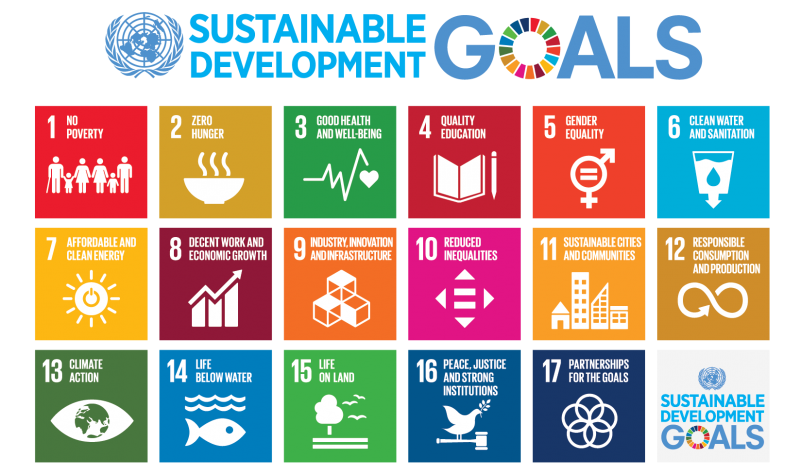Sustainable Development Goals (SDGs)
Definition:
- The Sustainable Development Goals (SDGs) are a set of 17 interconnected global objectives aimed at addressing pressing social, economic, and environmental challenges to achieve sustainable development by 2030.

- These goals were adopted by the United Nations General Assembly in 2015 as part of the 2030 Agenda for Sustainable Development, the SDGs were built upon the Millennium Development Goals (MDGs) and encompass a broader and more ambitious agenda.
- These goals cover a wide range of issues, including poverty eradication, quality education, gender equality, clean water and sanitation, affordable and clean energy, sustainable cities and communities, climate action, life below water, and life on land, among others.
- Each goal is accompanied by specific targets (a total of 169) to guide efforts towards its achievement.
- Every year, the UN Secretary General presents an annual SDG Progress report, which is developed in cooperation with the UN System, and based on the global framework and data from national statistical systems.
- While the SDGs are non-binding, all countries have committed to working towards their achievement, recognizing that these goals are a path towards sustainable development.
- However, progress towards the SDGs has been slow, with challenges exacerbated by factors such as the COVID-19 pandemic and insufficient attention to environmental goals.
Few Reasons for slow progress:
- Impact of COVID-19: Around the globe, the COVID-19 pandemic is still having a profound impact on the mental and physical health and well-being of individuals, households and communities worldwide.
- Rising levels of conflict war and instability: The world is currently witnessing the highest level of State-based armed conflicts seen since 1945.
- Violent conflict disrupts human development and causes insecurity, but also diverts private and public resources to spending on defence and reconstruction.
- For instance, in the Sahel region of Africa progress across the Sustainable Development Goals is being blocked by the growth of armed groups in the region. Between March and May 2022, approximately 26.5 million people in the Sahel were in crisis or worse with respect to food and nutrition.
- Inflation and the cost-of-living: The pandemic and subsequent recovery pushed up prices for food and energy, which rose further as a result of the conflicts in Ukraine, Gaza and Red Sea.
- Between June and September of 2022, around 89 per cent of least developed countries, 93 percent of landlocked developing countries and 94 per cent of small island developing States had food inflation above 5 per cent, with many experiencing inflation in the double digits
- Lack of Attention to Environmental Goals: There has been little or no attention towards goals related to the environment and biodiversity. These include responsible consumption and production, climate action, life below water, and life on land.
- Going against the Integrated Nature of SDGs: The current practice of pursuing SDGs goes against the integrated and indivisible nature of the goals. There’s a concern that pursuing SDGs separately without recognizing their interconnectedness may lead to accelerated environmental degradation.
Solutions to move towards SDGs:
- Developing a Shared Transformation Framework which involves the following.
- National plans of action to counter negative trends or stagnation in SDG implementation.
- Incorporation of local and industry-specific plans into national plans.
- Implementing initiatives to increase fiscal space through measures such as tax reforms, debt restructuring, and increased engagement by international finance institutions.
- Investing in data related to the SDGs, science-based tools, and policy learning.
- Strengthening partnerships to enhance the science-policy-society interface.
- Improving accountability of governments and other stakeholders.
- Building Capacity for Transformation by enhancing individual, institutional, and network-level capacities to strategize, innovate, manage conflicts, and cope with crises and risks.
- Implementing comprehensive interventions by implementing key interventions for sustainability transformation to achieve coherence and equity, ensuring advances in human well-being are not at the expense of climate, biodiversity, and ecosystems.
- Improving Fundamental Conditions for Implementation which includes:
- Investing in conflict prevention and resolution.
- Supporting marginalised groups.
- Leveraging the digital transformation.
- Investing in gender equality.
- Transforming Science and Approaches by ensuring that science, policy, and society work together for a future where people and nature can thrive as one.
The year 2024 is an election year across the world. At least 64 countries, both developed and developing, accounting for 49% of world population, will go to the polls. It is important for all the newly elected governments to ponder over the sustainability issue and align their national policies accordingly.
Source: https://sdgs.un.org/sites/default/files/2023-09/FINAL%20GSDR%202023-Digital%20-110923_1.pdf
Subscribe
Login
0 Comments
